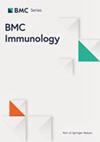Sec1 在炎症性肠病小鼠模型中调节肠粘膜免疫
IF 2.9
4区 医学
Q3 IMMUNOLOGY
引用次数: 0
摘要
炎症性肠病(IBD)是一种常见的免疫介导疾病,其分子发病机制仍未完全阐明。本研究旨在通过研究一个新的替代基因Sec1(Fut2和Fut1的邻近基因,在小鼠中共同编码α 1,2岩藻糖基转移酶),加深我们对FUT2在人类IBD中作用的理解。利用 CRISPR/Cas9 技术制备了 Sec1 基因敲除(Sec1-/-)小鼠。使用 3% w/v 硫酸右旋糖酐钠诱导小鼠患上 IBD。采用小干扰 RNA (siRNA) 在小鼠结肠癌细胞系 CT26.WT 和 CMT93 中沉默 Sec1。分别评估了 IBD 相关症状、结肠免疫反应、结肠上皮细胞的增殖和凋亡,以确定 Sec1 在小鼠 IBD 中的作用。研究还确定了 Sec1 对死亡受体 5(DR5)和其他凋亡相关蛋白表达的影响。研究发现,Sec1 基因敲除与小鼠 IBD 的恶化和结肠黏膜免疫反应的升高有关。在 CT26.WT 和 CMT93 细胞中沉默 Sec1 会导致炎性细胞因子 IL-1β、IL-6 和 TNF-α 分泌增多。细胞计数试剂盒 8(CCK8)测定、流式细胞术和 TUNEL 检测表明,Sec1 的表达促进了结肠上皮细胞的增殖,抑制了细胞凋亡,减少了细胞在 G0/G1 期的停滞,促进了炎症损伤的修复。在Sec1-/-小鼠和Sec1沉默的CT26.WT和CMT93细胞中,发现DR5和几种与细胞凋亡相关的效应蛋白过度表达,支持Sec1在细胞凋亡中的抑制作用。我们的研究结果描述了 Sec1 在小鼠 IBD 中的重要调控作用,进一步反映了 FUT2 在人类 IBD 发病机制中的重要性。Sec1 是人类 fut2 的代理基因,对小鼠 IBD 起着保护作用。Sec1 负向调节关键肠道炎症因子的分泌。Sec1支持细胞增殖并调节DR5岩藻糖基化和IEC凋亡。本文章由计算机程序翻译,如有差异,请以英文原文为准。
Sec1 regulates intestinal mucosal immunity in a mouse model of inflammatory bowel disease
Inflammatory bowel disease (IBD) is a common immune-mediated condition with its molecular pathogenesis remaining to be fully elucidated. This study aimed to deepen our understanding of the role of FUT2 in human IBD, by studying a new surrogate gene Sec1, a neighboring gene of Fut2 and Fut1 that co-encodes the α 1,2 fucosyltransferase in mice. CRISPR/Cas9 was used to prepare Sec1 knockout (Sec1−/−) mice. IBD was induced in mice using 3% w/v dextran sulphate sodium. Small interfering RNA (siRNA) was employed to silence Sec1 in murine colon cancer cell lines CT26.WT and CMT93. IBD-related symptoms, colonic immune responses, proliferation and apoptosis of colon epithelial cells were assessed respectively to determine the role of Sec1 in mouse IBD. Impact of Sec1 on the expression of death receptor 5 (DR5) and other apoptosis-associated proteins were determined. Sec1 knockout was found to be associated with deterioration of IBD in mice and elevated immune responses in the colonic mucosa. Silencing Sec1 in CT26.WT and CMT93 cells led to greater secretion of inflammatory cytokines IL-1β, IL-6 and TNF-α. Cell counting kit 8 (CCK8) assay, flow cytometry and TUNEL detection suggested that Sec1 expression promoted the proliferation of colon epithelial cells, inhibited cell apoptosis, reduced cell arrest in G0/G1 phase and facilitated repair of inflammatory injury. Over-expression of DR5 and several apoptosis-related effector proteins was noticed in Sec1−/− mice and Sec1-silenced CT26.WT and CMT93 cells, supporting a suppressive role of Sec1 in cell apoptosis. Our results depicted important regulatory roles of Sec1 in mouse IBD, further reflecting the importance of FUT2 in the pathogenesis of human IBD. Sec1, a proxy gene of human fut2, plays a protective role against mouse IBD. Sec1 negatively modulates the secretion of key intestinal inflammatory factors. Sec1 supports cell proliferation and regulates DR5 fucosylation and IEC apoptosis.
求助全文
通过发布文献求助,成功后即可免费获取论文全文。
去求助
来源期刊

BMC Immunology
医学-免疫学
CiteScore
5.50
自引率
0.00%
发文量
54
审稿时长
1 months
期刊介绍:
BMC Immunology is an open access journal publishing original peer-reviewed research articles in molecular, cellular, tissue-level, organismal, functional, and developmental aspects of the immune system as well as clinical studies and animal models of human diseases.
 求助内容:
求助内容: 应助结果提醒方式:
应助结果提醒方式:


